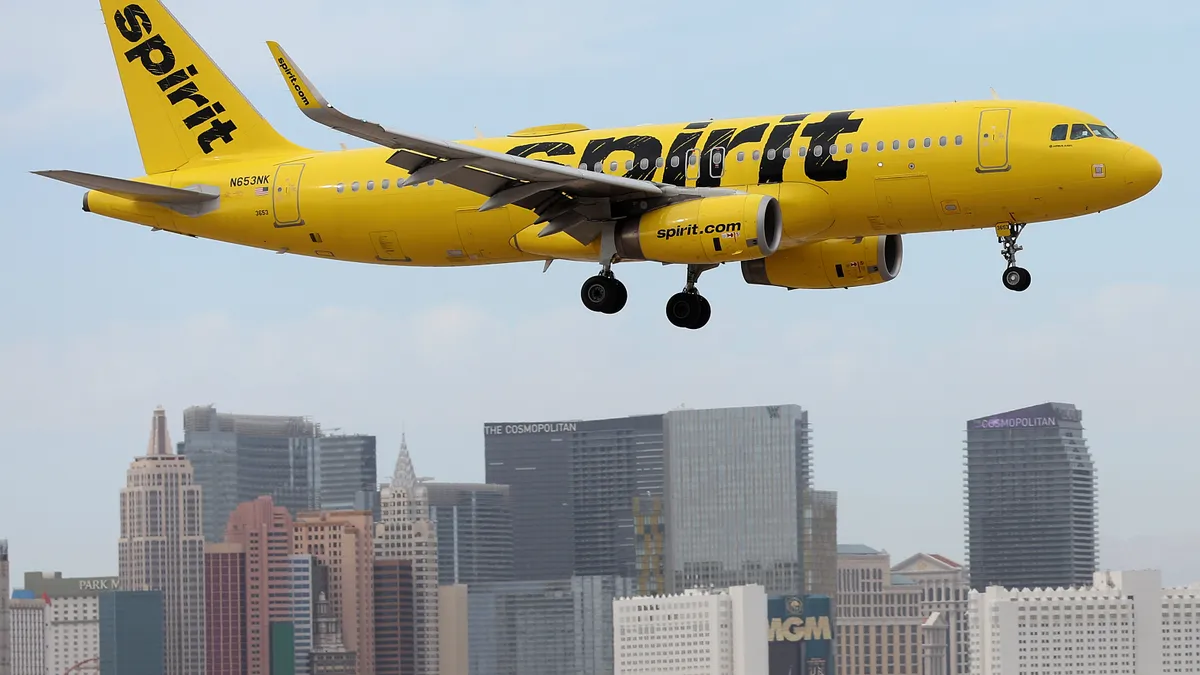Dive Brief:
- Spirit Aviation Holdings, parent of Spirit Airlines, said its CEO Ted Christie — a 13-year company veteran —has exited the carrier Monday and is stepping down from its board, according to a securities filing. The departure comes weeks after the airline emerged from a bankruptcy restructuring.
- The Dania Beach, Florida-based company said three senior executives will form the office of the president that will “lead the company” until a new CEO is appointed. The group includes Fred Cromer, executive vice president and CFO, John Bendoraitis, executive vice president and COO, and Thomas C. Canfield, senior vice president general counsel and secretary.
- The company also said Monday that Matt Klein, executive vice president and chief commercial officer, will be stepping down, effectively immediately, and be succeeded by Rana Ghosh, who joined the company in 2015 and has served as senior vice president and chief transformation officer since June 2024,.
Dive Insight:
On March 12, about five months after filing for bankruptcy protection, the company said it had emerged from its financial restructuring and completed a consensual “deleveraging transaction that equitizes approximately $795 million of funded debt.” At the time, Christie said the the company was now in a stronger financial position.
"Throughout this process, we've continued to make meaningful progress enhancing our product offerings, while also focusing on returning to profitability and positioning our airline for long-term success. Today, we're moving forward with our strategy to redefine low-fare travel with our new, high-value travel options," Christie said in a statement.
On Monday, Robert Milton, Spirit Airlines’ chairman, thanked Christie for his “tireless efforts” during his tenure at the company. “He has seen a lot and done a lot during his tenure here, including navigating the company through the COVID crisis and multiple strategic junctures, as well as most recently, a corporate restructuring,” Milton said. “He has kept the company together through challenging times, and for this we wish him all the best going forward.”
The budget carrier filed for Chapter 11 bankruptcy protection Nov. 18, pivoting to reorganize after other efforts to reduce cost and navigate industry headwinds failed. As of the petition, the airline had $3.6 billion in total outstanding debt, 21,000 employees and independent contractors, and a fleet of 213 A320 aircraft, 51 of which were owned by Spirit, CFO Dive previously reported.
In a bankruptcy court first-day declaration filing in November, Cromer described a company with Midwestern routes that was founded in 1964 as Clippert Trucking Company, a Michigan corporation that relocated to Florida in 1994, and took the Spirit Airlines name in 1992.
Spirit began operating what Cromer characterized as an “ultra low-cost carrier” nearly 20 years ago. Its business model entailed unbundling components of airfares that were typically included in airline tickets, allowing its flying customers to “save by paying only for the amenities they choose, such as baggage, seat assignments, priority boarding refreshments, and WiFi.”
Cromer, who took the finance reins of Spirit in July, is a 30-year veteran of the airline industry. He was previously CEO of Xwing, a developer of advanced autonomy systems for aviation and defense, and has served as president of Bombardier Commercial Aircraft, president of International Lease Finance Corp, and vice president and CFO of ExpressJet Airlines.














